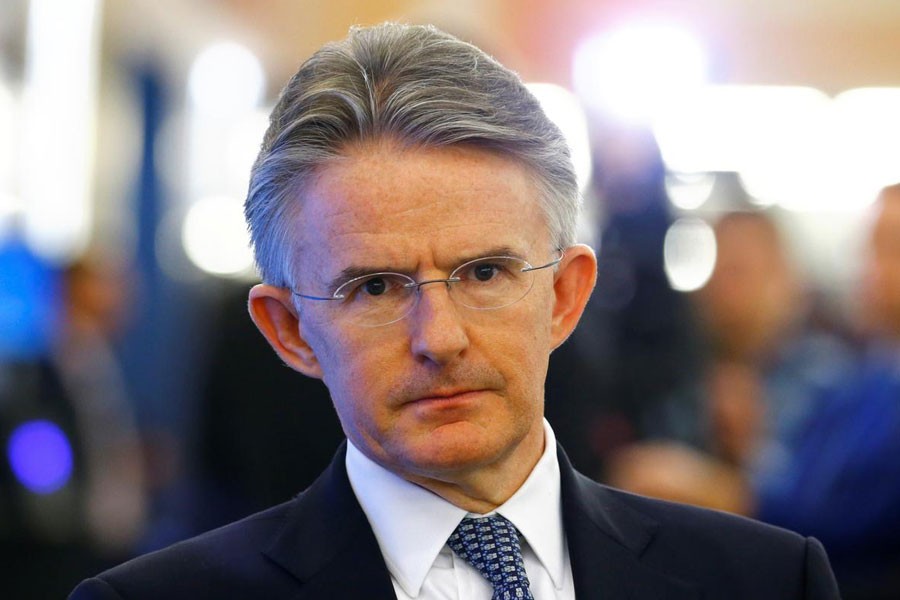HSBC ousted Chief Executive Officer John Flint after just 18 months in that role, in a surprise move that the lender’s chairman said was necessary to accelerate progress of its strategic priorities.
Flint’s exit, which a person familiar with the matter said was a result of differences over execution of his strategy, was disclosed by HSBC early on Monday along with its half-yearly results which had been scheduled for release later in the day.
The departure comes as Europe’s biggest bank is grappling with headwinds including an escalation of a trade war between China and the United States, an easing monetary policy cycle, unrest in the key Hong Kong market and uncertainty about Brexit.
Flint, 51, ran HSBC’s retail and wealth management business before taking over as CEO in February 2018. His appointment was the first major decision taken by the bank’s first externally appointed chairman Mark Tucker, who came on board in late 2017.
Tucker said a change of CEO was needed to accelerate progress in HSBC’s major strategic priorities, such as the turnaround of its US business, Reuters reported.
“It’s the right time for change, and doing it clearly and decisively from a position of strength is very important,” Tucker said, adding that the search for a new CEO could take up to a year.
HSBC's Hong Kong shares fell 1.4 per cent in afternoon trade, while the broader market .HSI was down 2.7 per cent.
The stock dropped even as the lender posted a 16 per cent rise in half-yearly profit and unveiled a buyback of up to $1 billion, defying some analysts’ expectations it might pause a strategy of returning extra capital to investors.
US WOES
London-headquartered HSBC, which makes more than 80 per cent of its profit in Asia, said that its global commercial banking unit head Noel Quinn will be interim chief executive. The board would consider internal and external candidates for the new CEO, it said.
A person familiar with the matter said Flint’s departure was a result of differences of opinion between Flint and Tucker over the pace and results of executing HSBC’s strategy.
The differences arose from Flint’s softer approach to cutting expenses and setting revenue targets for senior managers to boost profit growth, said the person, declining to be named due to the sensitivity of the issue.
An HSBC spokesman in Hong Kong declined to comment.
One of the main differences was related to efforts to turn around its under-performing US business, the person said. That unit posted a 1.5 per cent drop in profit in the January-June period compared to the half-year to December 2018.
HSBC hired Citigroup veteran Michael Roberts in July to head its US business, in a renewed effort to bring in external help to turn around the struggling unit.
The bank said on Monday that given the outlook for interest rates and revenue headwinds in its global banking and markets, and retail banking and wealth management businesses, it did not expect to achieve the targeted 6 per cent return on tangible equity (ROE) by 2020 in the US business.
That missed US goal is still below the overall group aim of getting to more than 11 per cent ROE by 2020.
The US business is not “getting the proper returns” that the bank would like to see, Chief Financial Officer Ewen Stevenson told Reuters, adding the unit has also been hit by the change in the monetary policy cycle.
Daniel Tabbush, an independent banking analyst who publishes his research on SmartKarma, said: “I can only speculate that he (Flint) was under-achieving on numbers. What may also be the case, but there is no way to know for sure, is that he may have been trying to push through real change and this was being frowned upon. On the surface, it does not look good and especially for so short a tenure as CEO.”
When he was picked as CEO, Flint was viewed by HSBC executives as a safe option as he had been with the bank since 1989 and worked across most of its businesses. He spent the first 14 years of his HSBC career in Asia.
Outlining his strategy at the helm of the bank in June last year, Flint set out plans to invest $15-$17 billion in the next three years in areas including technology and China.
REVENUE RISK
HSBC’s pre-tax profit for the first six months of 2019 rose to $12.41 billion from $10.71 billion in the same period a year earlier, helped by a surge in retail banking and Asia revenues.
The bank flagged the risk to its business from the US-China trade war and the change in the interest rate cycle.
The tit-for-tat tariff war between the world’s two largest economies has taken its toll on trade-focused banks like HSBC and rival Standard Chartered, which last week warned of an impact on its business customers from the escalating tensions.
“The outlook has changed. Interest rates in the US dollar bloc are now expected to fall rather than rise, and geopolitical issues could impact a significant number of our major markets,” HSBC said in its earnings statement.
The bank was “managing operating expenses and investment spending in line with the increased risks to revenue,” it said.
Prior to the latest buyback announcement, HSBC had purchased more than $6 billion of its own shares since 2016.
Analysts had been watching closely to see whether the bank would announce a fresh buyback, as a failure to do so would have been read as a sign of mounting caution by HSBC’s management.
HSBC posted its results on a day when Hong Kong, its second home, was plunged into fresh chaos due to a general strike, as protests against an extradition bill evolved into a broader backlash against the government.
Chairman Tucker played down the impact of that on the bank’s business and said the bank remained confident about the future of the Asian financial centre.


